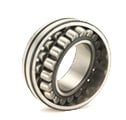The purpose of a rolling bearing is simple, reduce the rolling friction while supporting the applied load. Most rolling bearings are composed by two concentric rings – known as the inner and outer race – separated by a set of evenly spaced elements rolling in between them.
Selecting a bearing requires choosing a series of parameters, including not only the most appropriate type and correct size, but also the right material. In fact, making sure that the material has the appropriate strength and toughness for the design is extremely important for a bearing.

Another important parameter to consider is the environment that the bearing will be exposed to. Will your bearing come in contact with water? Acids? Reactive gases?
If so, there are a number of corrosion-resistant steels available. However, corrosion-resistant steels should be chosen carefully as higher corrosion resistance comes at the price of lower surface hardness and lower load capacity.
The most common material used for rings and rolling elements is chromium alloy steel that has been hardened – a heat treatment that increases steel’s hardness and tensile strength – which makes the bearing suitable for the majority of applications.
However, when the bearing has to withstand high loading conditions, heavy shock loads or survive in a dirty, rugged environment, case-hardened steel is a better choice.
Case-hardened steel bearings have a hard outer shell with a ductile inner core that makes them less susceptible to fracture, better for shock loads, and resistant against dust and grime.
There is definitely a lot to consider when selecting the appropriate bearing for your application, but at Action Bearing we’ll help you find the bearing you need. No matter what the application, our years of technical experience and our bearing know-how will guarantee that we’ll find the bearing that is right for you.

 Please visit Emersonbearing.com for our latest blogs and updates!
Please visit Emersonbearing.com for our latest blogs and updates!